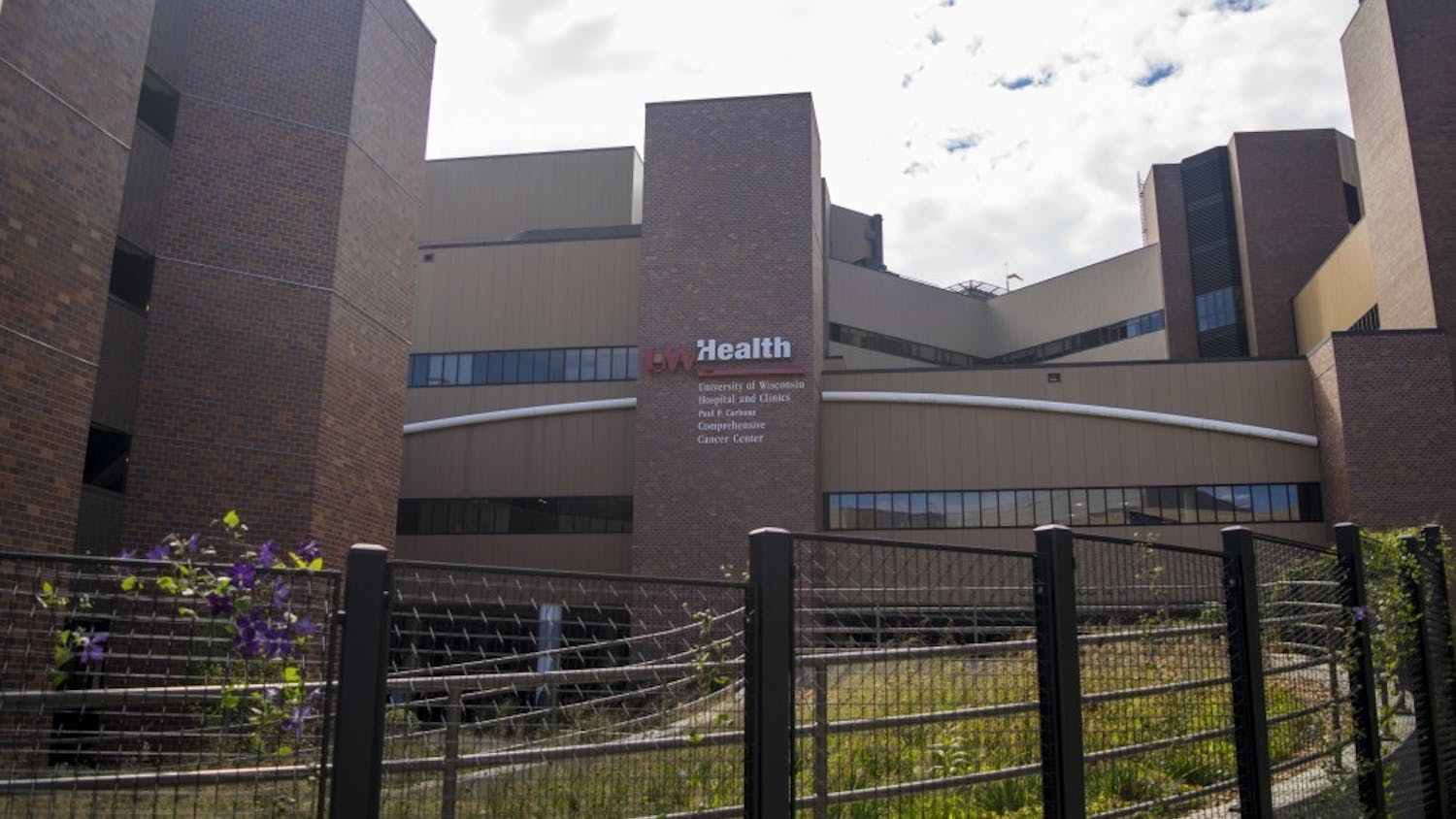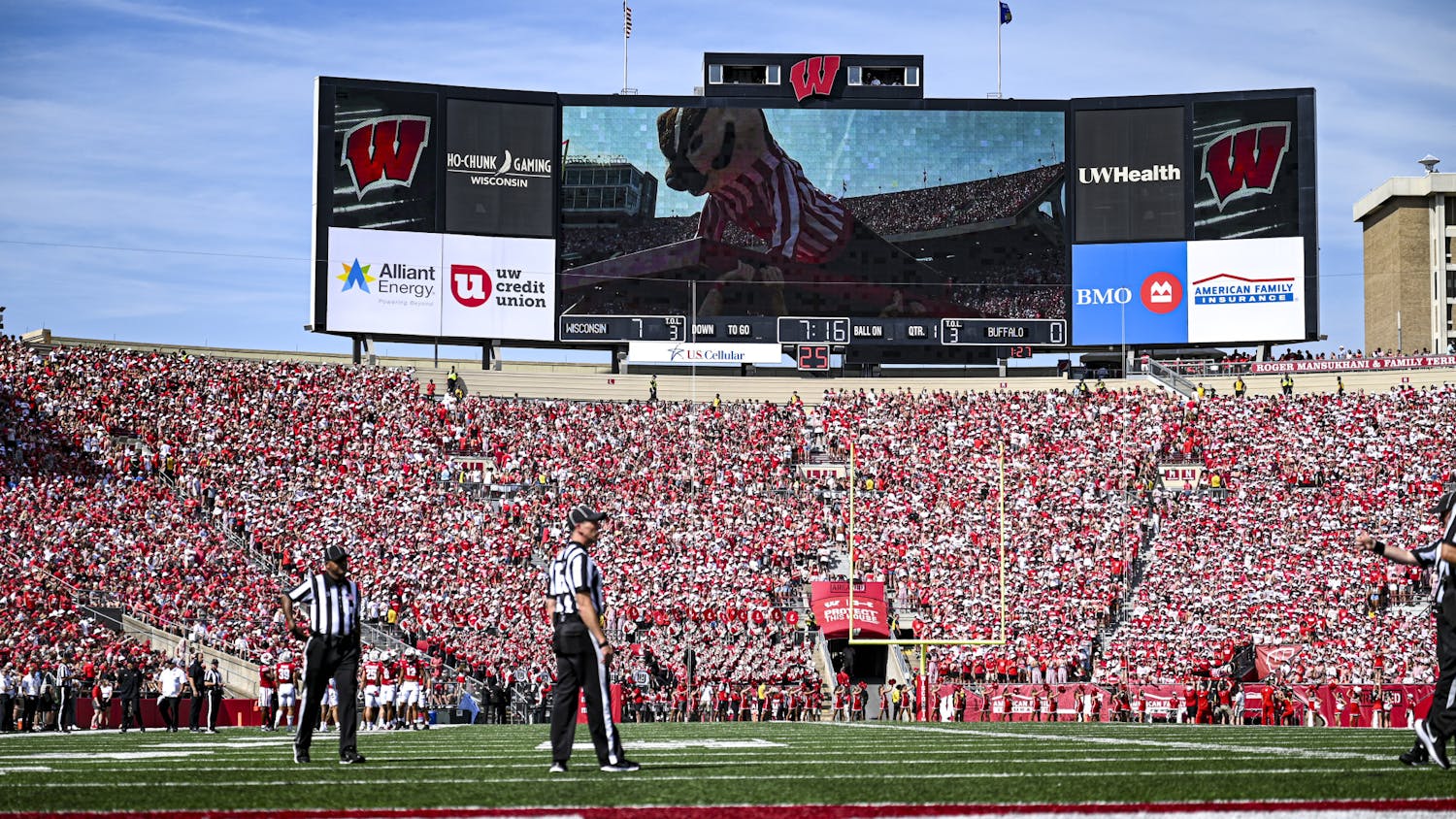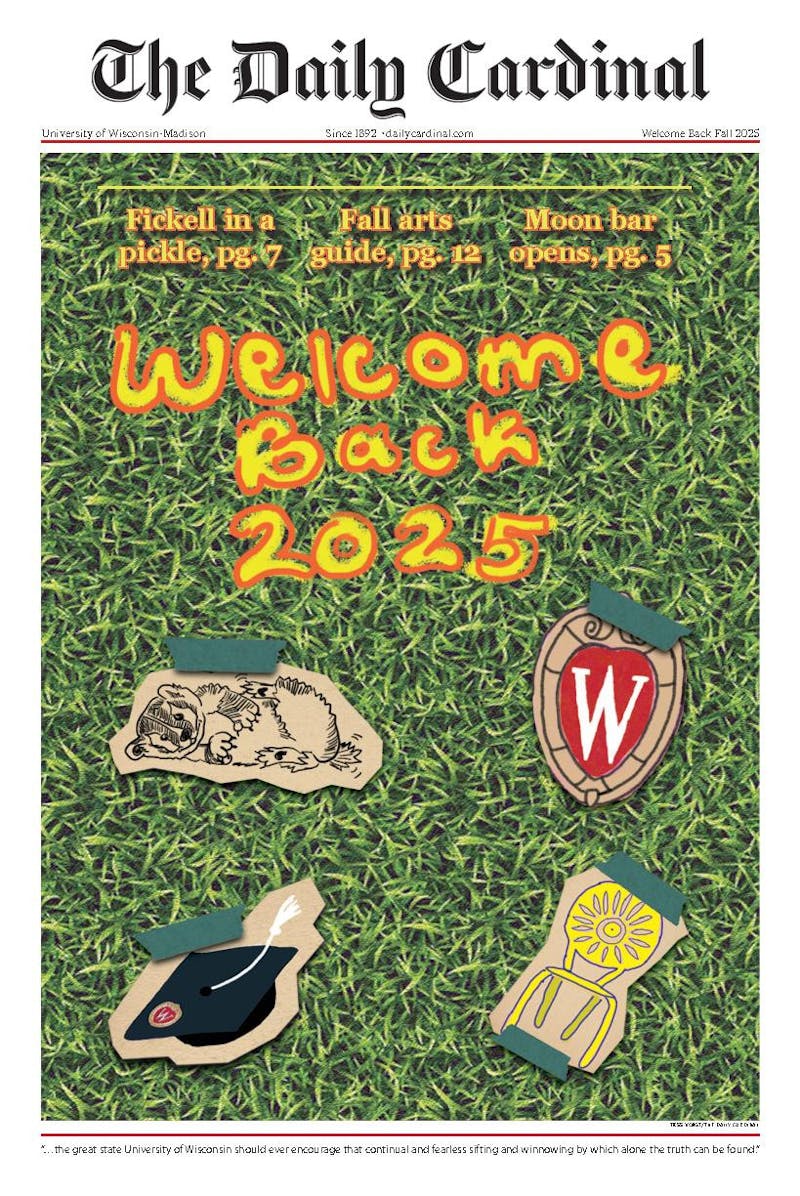With students buckling under the weight of ever-rising rent prices, both candidates for the District 8 City Council seat are vowing to make Madison more affordable and alleviate the housing crisis.
University of Wisconsin-Madison junior MGR Govindarajan and sophomore Charlie Fahey have each positioned themselves as people who intimately understand the problems facing students and are uniquely equipped to address them by virtue of their experiences.
The District 8 seat, which encompasses much of the UW-Madison campus, has long functioned as the student voice in the common council. The seat is currently held by Juliana Bennett, who has served in the position since 2021. Bennett chose to run for the District 2 council seat instead this election cycle.
In an interview with The Daily Cardinal, Govindarajan said he wanted to run for alder to increase the power of students on the common council. As the Legislative Affairs Chair for the Associated Students of Madison, Govindarajan said he had been advocating for students for the past two and a half years and decided it would be worthwhile to bring these issues to the council to affect greater change.
Govindarajan has been endorsed by a bevy of local politicians and community leaders — including Madison Mayor Satya Rhodes-Conway, Rep. Francesca Hong and Ald. Bennett — who lauded his track record of uplifting student voices and his understanding of the issues students face. He underlined how much of his platform was written in collaboration with student organizations and emphasized how his campaign was about “bringing people into the process.”
“[If elected] I want to do more than just represent students — I want students to represent themselves,” Govindarajan said. “I want to be able to uplift their voices. Were I to get elected, when I eventually leave office, I want it to be known that students are more involved in local politics than they were two years ago.”
Fahey, a political science major, is also a member of ASM, having served on the Student Services Finance Committee and now as a council member. He also serves as an editor for Equilibrium, the university’s undergraduate economics journal.
Fahey told The Daily Cardinal his background gives him a unique perspective on the issues facing Madison.
“I grew up on an apple farm where I learned a lot about the interactions between the food people eat, cities and green spaces. All of that interacts into a strong city,” Fahey said. “That combined with my recent work as a housing advocate with the Campus Area Neighborhood Association, I think, gives me a very unique perspective.”
Housing
With the past two UW-Madison freshman classes breaking enrollment records, student housing has been pushed to the limit as residence halls are unable to accommodate the influx of students. Furthermore, rising rent prices across Madison have left off-campus housing increasingly unaffordable for many students. Both candidates said addressing the rising cost of housing would be their biggest priority in office.
Govindarajan said he would work with the university and financial aid office to enroll a manageable number of students and make rent more affordable. His plan would have the city and UW-Madison commit to working together, and Govindarajan in particular underscored the necessity of creating affordable housing in the downtown area — a crucial concern for students he said the current city budget doesn’t do enough to address.
For Govindarajan, solutions start by involving students in the discussions taking place and noting that, as legislative affairs chair, he advocated for greater student input.
“I genuinely believe that everything that takes place needs to have the voices of students,” Govindarajan said. “It goes from underrepresented communities to students who can afford the luxury houses to students who might have a mobility disability.”
He proposed eliminating food deserts on campus to help students better afford necessities such as groceries and said he would push for the university to expand Bucky’s Pell Pathway, UW-Madison Chancellor Jennifer Mnookin’s tuition-assistance program. Govindarajan said he hoped Bucky’s Tuition Promise would also be expanded, mentioning that as a recipient he’s aware of the impact the program has on the thousands of students who rely on it.
Fahey also highlighted the disconnect between the city’s capacity and the number of students looking for housing, and he emphasized the need to build more housing units in Madison. Referencing his experience as an advocate with the Campus Area Neighborhood Association, where he worked with developers and local stakeholders, Fahey said he would address rising rent by working to change city ordinances to build more affordable housing.
He tied the lack of affordable housing in Madison to the city’s homelessness problem, constructing an example of a student who is unable to pay rent and has to move from “couch to couch.”
“That's tied really closely to the affordability issue we have here in the city of Madison,” Fahey said. “And that's what I'm running on. We got to make Madison more affordable [and] reduce the cost of living, or at least try and stop the increases and construct more affordable housing.”
Fahey said the city should address homelessness by keeping the streets clean, providing public services and connecting the university and city, especially for volunteering purposes. He contended that the best way to raise people out of homelessness would be to put people in a position where they could make choices and said public policies were being oriented to reflect that.
Govindarajan said he would support measures to provide adequate housing to people experiencing homelessness.
“Whatever I can do to decrease the homeless population and make sure people get good housing, I will support that,” Govindarajan said. “Because I genuinely believe that housing is a human right.”
Safety
Currently, Madison doesn’t require body cameras for its police officers. In April 2022, the Common Council approved a pilot program to outfit officers in Madison's North District with body cameras, but the program remains in the planning stages. One of the key components of Fahey’s campaign is to implement body cameras for all police officers if elected.
“We're one of the largest cities in the United States that doesn't have body cameras for police officers,” Fahey said. “I think that’s shameful. If elected, I could be a decisive vote for body cameras for police officers.”
Fahey in particular singled out Govindarajan, who he said opposed body cameras for officers.
Govindarajan disputed this, explaining he supported the pilot program but was waiting for its findings before committing to a city-wide body camera program, indicating studies suggesting these programs could be costly and exploited by police.
“I want to make sure the program we have is actually good for people,” Govindarajan said. “If body cameras work, I'm all for it.”
Govindarajan’s plan for the police would ensure members of underserved communities, such as people of color, the LGBTQ community and people with disability issues sit on police oversight boards. He also called for training so officers can react to mental health issues and people with disabilities in a compassionate way, and he said putting members of these groups on oversight boards could help facilitate a better response.
His plan also includes investing in and raising awareness of resources such as the Rape Crisis Center, Promoting Awareness and Victim Empowerment (PAVE), and University Health Services as well as increasing lighting on streets and walkways, particularly the Southwest Commuter Path and Lakeshore Path.
As Legislative Affairs Chair, Govindarajan noted his role in ongoing negotiations with the Rape Crisis Center to provide more resources to campus, and his work with the Governors office to provide UW-Madison’s Co-Responder program more funding. Govindarajan said he wanted to expand Madison’s CARES program — which enables mental health professionals to respond to nonviolent mental health emergencies instead of police — to 24/7, with the goal of getting the Madison Police Department out of the situation entirely.
According to his campaign platform, his plan would eventually merge the Co-Responder Program and CARES to provide students living on and off campus the same resources. Additionally, Govindarajan said he would try to work with the district attorney to handle more cases of sexual violence, which are rarely prosecuted.
Fahey listed greater support for mental health services as one of his top budget priorities, and said he said he would improve street lighting on Lakeshore Path and across the district.
Transportation
Both candidates stressed the necessity of ensuring Madison has a transportation system that works for everyone.
Govindarajan outlined his plan to increase bike safety by creating dedicated bike lanes throughout the city and expanding the use of protected bike lanes on major roads and intersections. Moreover, Govindarajan said he would push to transition Madison’s buses into an all-electric fleet and support a new bus route that would travel opposite the 80 to better service residents of Lakeshore residence halls.
Fahey said he would strive to ensure campus residents get the most out of Madison’s bus rapid transit system while keeping it affordable.
“[My goal is] trying to expand public transportation, keep it affordable, while also making sure that we're doing so in a fiscally responsible way so we don't have to raise sales taxes across the city,” he said.
Another pillar of Fahey’s platform is his support for small businesses and students aspiring to be entrepreneurs. Drawing on his own experience as part of a small business family, Fahey voiced his desire for students and recent graduates to start their businesses in Madison.
“There's a strong relationship between the campus and State Street,” Fahey said. “Trying to support those workers directly and advocate effectively for businesses across State Street and small businesses across the community is something that's important to me.”
Referencing Madison’s status as one of the fastest growing start-up cities in the nation, Fahey said he would seek to connect aspiring entrepreneurs with Madison’s business community and serve as a “cheerleader” for State Street businesses and workers.
The race has largely played out along parallel tracks, with Govindarajan and Fahey campaigning to students but not directly engaging with each other. A planned debate between the candidates fell apart after Fahey declined to participate, which Govindarajan decried as consistent with Fahey’s nonattendance at candidate forums.
“It’s upsetting and undemocratic to refuse to debate in a district like this,” Govindarajan said in a statement. “District 8 deserves an Alder who works with their community. How can we expect Charlie to represent us if he refuses to publicly talk about his ideas as a candidate?”
Fahey said he declined to take part in the debate because he felt it was a better use of time to talk to students directly rather than focus on students at the event who he said had already made up their minds on who to vote for.
“It would be wrong for me to just not do the debate because I'm afraid to talk about my views, or I'm afraid to debate him,” Fahey said. “I was a debate champion in high school. I have no problem debating.”
Fahey pointed to how he talked with “thousands of residents at campus fairs, club events, dining halls, libraries and [at their houses]” on their struggles to find a lease and afford rent, calling this campaign method of meeting constituents one-on-one “proactive democracy.”
Both candidates vowed to be accessible alders. Fahey summarized his approach as, “If you need me, I’m there,” declaring that “leaders should go to their constituents, not the other way around.”
Similarly, Govindarajan said the responsibility was on the city to reach out to students and said, as alder, he would ensure more direct outreach would be done on the part of the city to connect with students.
The Common Council election will be held April 4. In addition to the Common Council races, the mayoral election between incumbent Satya Rhodes-Conway and former Deputy Mayor Gloria Reyes will also be on the ballot in addition to a host of city and statewide referendums.
Gavin Escott is the campus news editor for the Daily Cardinal. He has covered protests, breaking news and written in-depth on Wisconsin politics and higher education. He is the former producer of the Cardinal Call podcast. Follow him on X at @gav_escott.






